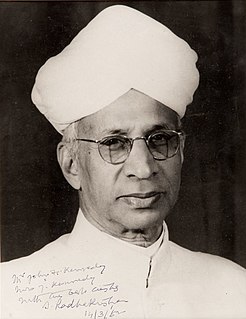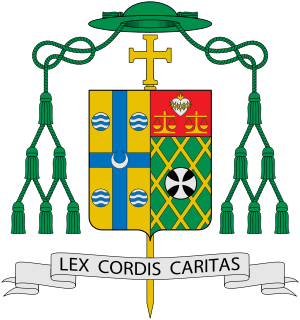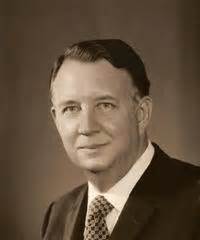A Quote by Sarvepalli Radhakrishnan
Hinduism is not just a faith. It is the union of reason and intuition that can not be defined but is only to be experienced. Evil and error are not ultimate. There is no Hell, for that means there is a place where God is not, and there are sins which exceed his love.
Related Quotes
We trample the blood of the Son of God underfoot if we think we are forgiven because we are sorry for our sins. The only reason for the forgiveness of our sins by God, and the infinite depth of His promise to forget them, is the death of Jesus Christ...No matter who or what we are, God restores us to right standing with Himself only by means of the death of Jesus Christ...To identify with the death of Jesus Christ means that we must die to everything that was never a part of Him.
Evil exists because of the disobedience of Satan. God gave Satan, and the angels, and man free will. Satan used his free will and abused it by not obeying authority. Hell was created by Satan’s disobedience to God, and his purposeful removal from God’s love—which is what hell is. Removing yourself from God’s love. You send yourself to hell. God does not send you there.
The Deceiver can magnify a little sin for the purpose of causing one to worry, torture, and kill oneself with it. This is why a Christian should learn not to let anyone easily create an evil conscience in him. Rather let him say, "This error and this failing pass away with my other imperfections and sins, which I must include in the article of faith: I believe in the forgiveness of sins.
We can think of Lent as a time to eradicate evil or cultivate virtue, a time to pull up weeds or to plant good seeds. Which is better is clear, for the Christian ideal is always positive rather than negative. A person is great not by the ferocity of his hatred of evil, but by the intensity of his love for God. Asceticism and mortification are not the ends of a Christian life; they are only the means. The end is charity. Penance merely makes an opening in our ego in which the Light of God can pour. As we deflate ourselves, God fills us. And it is God’s arrival that is the important event.
Evil does not exist sir, or at least it does not exist unto itself. Evil is simply the absence of God. It is just like darkness and cold, a word that man has created to describe the absence of God. God did not create evil. Evil is not like faith, or love that exist just as does light and heat. Evil is the result of what happens when man does not have God's love present in his heart. It's like the cold that comes when there is no heat or the darkness that comes when there is no light.
When one has once accepted and absorbed Evil, it no longer demands the unfitness of the means. The ulterior motives with which youabsorb and assimilate Evil are not your own but those of Evil.... Evil is whatever distracts. Evil knows of the Good, but Good does not know of Evil. Knowledge of oneself is something only Evil has. One means that Evil has is the dialogue.... One cannot pay Evil in installments--and one always keeps on trying to.
There is something you can't fix, can't heal, or can't escape, and all you can do it trust God. Finding ultimate refuge in God means you become so immersed in his presence, so convinced of his goodness, so devoted to his lordship that you find even the cave is a perfectly safe place to be because he is there with you.
Under a government which imprisons any unjustly, the true place for a just man is also in prison, the only house in a slave State in which a free man can abide with honor. They do not know how much truth is stronger than error, nor how much more eloquently and effectively he can combat injustice who has experienced a little in his own person. If the alternative is to keep all just men in prison, or give up war and slavery, the State will not hesitate which to choose.
People think of faith as being something that you don't really believe, a device in helping you believe simply it. Of course that is quite wrong. As Pascal says, faith is a gift of God. It is different from the proof of it. It is the kind of faith God himself places in the heart, of which the proof is often the instrument... He says of it, too, that it is the heart which is aware of God, and not reason. That is what faith is: God perceived by the heart, not be reason.


































